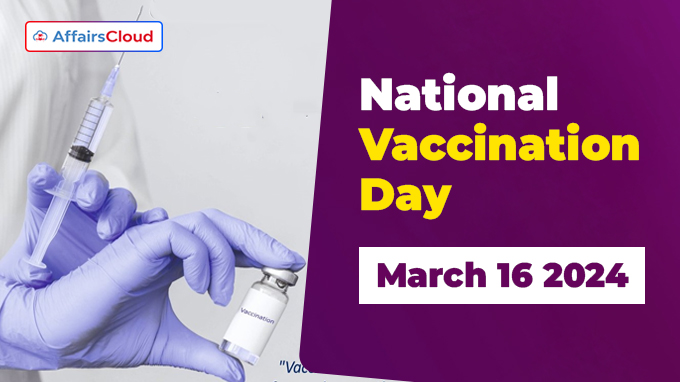 National Vaccination Day or National Immunisation Day is annually observed across India on 16 March to raise awareness of the significance and value of vaccination in human health and highlight the crucial role vaccines play in preventing diseases and protecting public health.
National Vaccination Day or National Immunisation Day is annually observed across India on 16 March to raise awareness of the significance and value of vaccination in human health and highlight the crucial role vaccines play in preventing diseases and protecting public health.
- The Day recognises the hard work of doctors and frontline healthcare workers to ensure the vaccination of every child.
- The Day also highlights the important role of full vaccination in protecting children from vaccine-preventable diseases (VPDs).
The 2024 theme of National Vaccination Day is, “Vaccines Work for All.”
Note: The theme underscores the crucial role vaccinations play in safeguarding lives from preventable diseases.
Background:
i.The World Health Organisation’s (WHO) Global Polio Eradication Initiative (GPEI) began in 1988 as the first step to remove Polio from the planet.
ii.National Vaccination Day commemorates the 1st dose of the Oral Polio Vaccine (OPV) being administered in India on 16 March 1995, as part of WHO’s GPEI.
iii.Since then, India has been celebrating National Vaccination Day every year.
National Immunisation Day Program:
i.In 1995, India launched the National Immunisation Day (NID), popularly known as the Pulse Polio Immunisation program, which is conducted twice annually during the early part of each year.
ii.The Pulse Polio Immunisation program was introduced as part of the National Polio Eradication Program (NPEP).
iii.The Polio NID is also known as “Polio Ravivar” (polio Sunday).
- The Sundays on which the immunisation program is conducted are known as Polio Ravivar or National Immunisation Day.
iv.India continues to hold 1 NID and 2 Sub-National Immunisation Days (SNIDs) for polio annually to maintain population immunity against wild poliovirus and to sustain its polio-free status.
Note:The first 2 NIDs for poliomyelitis eradication in India were conducted on December 9, 1995, and January 20, 1996.
Points to Note:
i.On 27th March 2014, the Southeast Asia Region (SEAR) of the World Health Organisation (WHO) including India was certified polio-free by the “Regional Certification Commission (RCC)”.
ii.On 24th February 2012, WHO removed India from the list of “endemic countries with active poliovirus transmission.”
iii.India reported the last polio case on 13 January 2011 from Howrah, West Bengal.
Key Points:
Vaccines: These are crucial tools in safeguarding against severe diseases. They stimulate the immune system to fight off pathogens without causing illness.
- Vaccines contain weakened or killed germs, prompting the immune system to produce antibodies.
Vaccination: It is a simple, safe, and effective way of protecting against harmful diseases. It raises a robust immune response, fortifying overall health.
Immunisation: It is the process of giving a vaccine to a person to protect them against disease.
Vaccination Programs in India:
Universal Immunisation Program (UIP):
It is one of the largest public health programs in the world. In India, vaccination against polio was initiated in 1978 under the Expanded programme on Immunization (EPI). Later the EPI was renamed as UIP in 1985 and it was expanded beyond urban areas
Mission Indradhanush (MI):
i.MI was launched in December 2014 and aims to increase the full immunisation coverage to children to 90%, particularly targeting areas with low coverage and difficult accessibility.
ii.6 phases of MI have successfully covered 554 districts nationwide.
iii.MI is integrated with Gram Swaraj Abhiyan and Extended Gram Swaraj Abhiyan, amplifying its reach across thousands of villages and aspirational districts.




